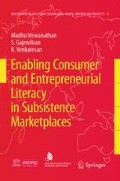This chapter provides a brief summary of our basic research. The discussion is organized by first describing the method we employed. We then present a background on the individual context and the larger marketplace context, followed by brief profiles of a buyer and a seller that put human faces to our research. We also discuss product interactions, marketplace interactions, and unique characteristics of the product and market interactions that we studied. The final section focuses on the development of consumer and entrepreneurial skills in the subsistence marketplaces we studied.
Access this chapter
Tax calculation will be finalised at checkout
Purchases are for personal use only
Preview
Unable to display preview. Download preview PDF.
References
Coleman, J. S. (1988). Social capital in the creation of human capital. American Journal of Sociology, 94, Suppl., S95–S120.
Iyer, S., Kiston, M., and Toh, B. (2005). Social capital, economic growth and regional development. Regional Studies, 39, 1015–1040.
Kranton, R. E. (1996). Reciprocal exchange: A self-sustaining system. The American Economic Review, 86, 830–851.
Maslow, A. (1970). Motivation and Personality. New York: Harper & Row.
Michaels, J. W. and Wiggins, J. A. (1976). Effects of mutual dependency asymmetry on social exchange. Sociometry, 39, 368–376.
Molm, L. D. (1994). Dependence and risk: Transforming the structure of social exchange in the eye of the beholder. Social Psychology Quarterly, 57(3), 163–176.
Molm, L. D. (2001). Theories of social exchange and exchange networks. In: G. Ritzer and B. Smart (eds.), The Handbook of Social Theory. London: Sage.
Rutherford, S. (2000). The Poor and Their Money. New Delhi: OUP.
Strauss, A. and Cobin, J. (1998). Basics of qualitative research: Techniques and procedures for developing grounded theory, Beverly Hills, CA: Sage.
Viswanathan, M., Rosa, J. and Harris, J. (2005). Decision making and coping of functionally illiterate consumers and some implications for marketing management. Journal of Marketing, 69(1), 15–31.
Rights and permissions
Copyright information
© 2008 Springer Science + Business Media B.V
About this chapter
Cite this chapter
(2008). Basic Research on Low-Literate, Low-Income Buyers and Sellers. In: Enabling Consumer and Entrepreneurial Literacy in Subsistence Marketplaces. Education in the Asia-Pacific Region: Issues, Concerns and Prospects, vol 12. Springer, Dordrecht. https://doi.org/10.1007/978-1-4020-5769-4_1
Download citation
DOI: https://doi.org/10.1007/978-1-4020-5769-4_1
Publisher Name: Springer, Dordrecht
Print ISBN: 978-1-4020-5768-7
Online ISBN: 978-1-4020-5769-4
eBook Packages: Humanities, Social Sciences and LawEducation (R0)

